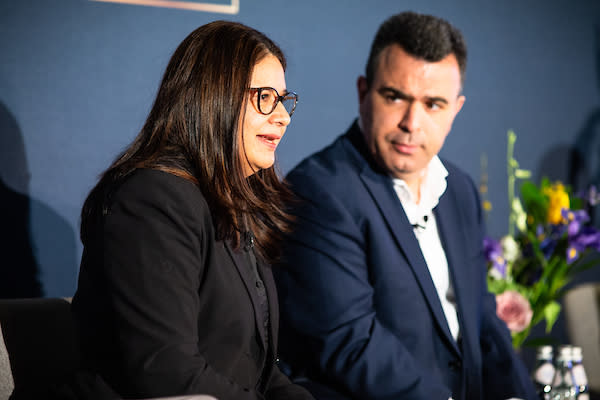Where Were You When You Heard About Rana Plaza?

Nazma Akter remembers being on her way to her office in Dhaka when she heard about the 8:57 a.m. collapse of Rana Plaza. Before the workers’ rights activist and Bangladeshi Awaj Foundation founder learned there were more than 3,000 workers inside, more than a third of whom would be found dead in the rubble, her first thought went to news reports from the day before about factory workers complaining about cracks in the building, she told attendees at the Sourcing Journal Sustainability Summit last week. Many of the workers told management they did not feel safe going back to work, but were told if they didn’t they wouldn’t be paid for the entire month, meaning the previous 23 days of labor would have been all for naught.
“I went there about an hour after the collapse and saw a lot of ambulance, rescue people and people screaming and crying,” Akter told panel moderator and Sourcing Journal sourcing and labor editor Jasmin Malik Chua in a video interview. “There was a large shipment, a political strike, so the factory manufacturers told them if they do not go for work they will not get salary. They had four days until the end of the month, so they didn’t have the option, didn’t have the choice.”
More from Sourcing Journal
International Trade Groups Call for Maritime Security in Red Sea
Trump's Threat to Increase China Tariffs Could be 'Catastrophic to the American Economy'
For Bangladesh's Garment Sector, the 'Spotlight Moves' But Struggles Continue
Avedis Seferian, who had become president and CEO of Worldwide Responsible Accredited Production less than a year before the disaster, remembered being awakened to the news late at night by his country manager and mobilizing humanitarian efforts within hours.
“None of the factories that were involved were certified, so it was entirely a humanitarian mission,” said Seferian, whose company is the world’s largest verifier of apparel factory safety. “We mobilized some funds, got some donations and my staff was actually on the ground that day, helping volunteers move the rubble and get water out to the rescue team. I mean, those images are seared in my brain so it was certainly a day I will never forget.”

Jason Judd, executive director for the Cornell University Global Labor Institute, said he was in Phnom Penh when the news broke, but felt the full weight of the tragedy two weeks later when a Cambodia footwear factory collapse killed two workers.
And Nate Herman, SVP for policy at the American Apparel and Footwear Association (AAFA) was hosting one of this organization’s events in Baltimore when he heard about Rana Plaza.
“I had the responsibility to tell the 150 people attending the conference what happened,” Herman said. “We had a moment of silence after that and the proceeding week we started working on what became the alliance for worker safety.”
A day removed from the 10th anniversary of the Rana Plaza disaster, the panel reflected on some positives that came out of the tragedy, namely the rollout of the Bangladesh Accord on Building and Fire Safety, a binding commitment created three weeks after the collapse, which, to date, has been signed by 197 brands and inspired a similar version for Pakistani workers launched two years ago that’s landed 49 brands, but only American Eagle Outfitters and Calvin Klein on board as major U.S. labels.
Herman said the fallout from the Rana Plaza disaster forced two major cultural changes in the garment sector.
“Workers safety is not a ‘nice-to-have,’ it’s a fundamental right. You should expect, when you go to work in the morning that you will be able to come back home,” Herman said. “And you have to collaborate. That was the other sea change for the industry, realizing that if you collaborate the sky doesn’t fall… If you’re transparent about doing audits in factories, the sky doesn’t fall.”

Seferian noted that 10 years since the tragedy, responsibility for worker safety is understood to be shared throughout the supply chain, all the way down to the consumer, and that for all the attention paid to binding accords and government action, enforcing existing laws is as important as enacting new ones.
“That [Rana Plaza] building was never meant to be that tall, never meant to be built with the materials it was built with, and the alliance brings that home. But the code that was in place wasn’t a terrible code; it just hadn’t been properly enforced, properly regulated,” Seferian said. “There is accountability to be had all across the supply chain… supply chains work holistically and we are literally all in this together. It’s not one end of it vs. the other.”
Akter said that by the 20-year anniversary of Rana Plaza, she hopes workplace measures like the Bangladesh Accord, which she said covers 2 million—nearly half of Bangladesh’s 4 million garment workers—are a global standard.
“Safety is the first priority. If I’m scared my workplace is not safe, then how do I work? How do I make the garments?” she said. “It’s also not good for the industry because it is not helpful for their productivity. It’s in their interest. Worker safety is a more important subject for everyone.”

